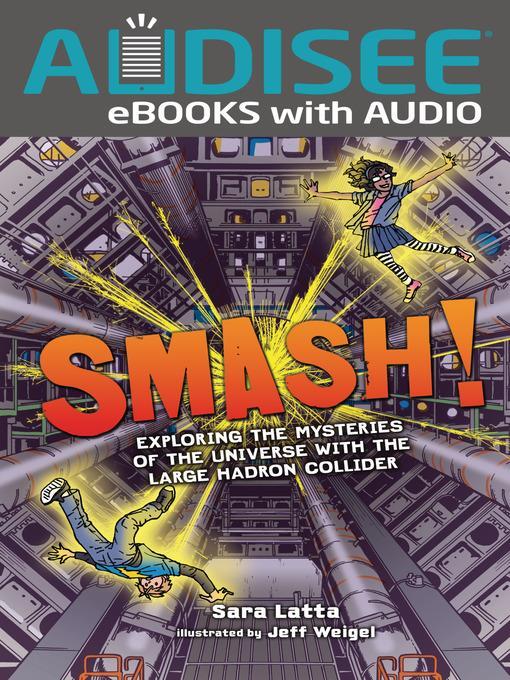
Smash!
Exploring the Mysteries of the Universe with the Large Hadron Collider
فرمت کتاب
ebook
تاریخ انتشار
2018
Lexile Score
670
Reading Level
3
نویسنده
Sara Lattaشابک
9781541529809
کتاب های مرتبط
- اطلاعات
- نقد و بررسی
- دیدگاه کاربران
نقد و بررسی

February 27, 2017
When Nick needs to create a comic book superhero for a competition, he enlists the help of his cousin, Sophie, a physics wiz who gives him a tour of CERN, home to the Large Hadron Collider. Their jaunt through the CERN facilities in Geneva turns into a tutorial about the complex history and science behind the discovery of the Higgs-Boson particle. Latta (Scared Stiff) methodically builds up background information about fundamental particles to explain how it all fits together (“The standard model was a good theory, but... it couldn’t explain why some particles have mass,” explains physicist Peter Higgs, making a cameo). Weigel’s (Dragon Girl: The Secret Valley) b&w illustrations help make each concept clear: in one scene, the cousins pass a basketball back and forth on an ice rink, the ball acting like a “force carrier” as the kids are pushed farther apart with each catch. The comic-making thread feels like an unnecessary overlay, and the jokes are occasionally corny, but overall it’s an engaging introduction to particle physics, the Big Bang, dark matter, and more. Ages 13–up. Illustrator’s agent: Steven Chudney, Chudney Agency.

January 1, 2017
Gr 7 Up-An accessible look at the Large Hadron Collider (LHC) and particle physics. Nick, an aspiring comic book creator, visits his cousin Sophie at the European Organization for Nuclear Research, where her parents work as physicists. Nick doesn't know a lot about science but is looking for superpower ideas for his characters. Sophie enlightens Nick with help from a pair of graduate students. Nick learns about forces, quarks, neutrinos, and more. The text conveys the excitement surrounding the 2012 discovery of the Higgs Boson and concludes with the mysteries of dark matter that have yet to be cracked by science. Principles of particle physics may seem hard to grasp, but Latta uses humor and real-world examples to keep readers engaged. The illustrations will go far in making concepts understandable. VERDICT This title will be sought out for both pleasure reading and report writing. For all middle and high school science collections.-Allison McLean, Elkhart Public Library, IN
Copyright 2017 School Library Journal, LLC Used with permission.

January 15, 2017
Two young visitors take simultaneous tours of the world of subatomic particles and of the largest scientific instrument ever built.As in her picture book Stella Brite and the Dark Matter Mystery (illustrated by Meredith Johnson, 2006), Latta brushes a thin gloss of storyline over a series of lucid lectures delivered largely in dialogue. Following an introduction to quarks and other components of the Standard Model of particle physics that's capped by a quick trip back to the Big Bang, science-minded Sophie leads her more artistically inclined cousin Nick to a meeting with two grad-student tour guides at CERN. From there it's on to view parts of the Large Hadron Collider, from a locomotive-sized linear accelerator to the 27-kilometer tunnel in which protons zip to incredible collisions that have, most recently, led to glimpses of the elusive Higgs boson. In panels that are large enough to accommodate hefty dialogue balloons without looking overcrowded, Weigel mixes realistically drawn people--including Einstein, Peter Higgs, and other renowned scientists--with intricately detailed devices and playful but illuminating visualizations of events at both subatomic and universewide levels. In the black-and-white illustrations everyone has light skin, but Sophie is biracial, and some figures may have Asian features. Summary looks at particle physics' pioneers and certain still-unsolved mysteries are appended. Big tech at its biggest; weird science at its weirdest: readers will echo Sophie's "It's amazeballs!" (glossary, resource lists) (Graphic fiction/nonfiction hybrid. 10-14)
COPYRIGHT(2017) Kirkus Reviews, ALL RIGHTS RESERVED.

January 1, 2017
Grades 8-11 Informational graphic novels are generally too dense with facts to invite a browse yet structured so they're not conducive to straight research. How do we accommodate them in a collection? Whose hands are they meant for? Luckily, many young minds are hungry for questions that lead them to ever newer and deeper questions. SMASH! offers this in spades as Nick and Sophie take a tour that leads from the smallest particles to the biggest bang, culminating with the Large Hadron Collider and how physicists use it to search for the building blocks of the universe. Though it's as dense as expected, Latta keeps the book from getting bogged down by offering clear, concise explanations that will appeal to those whose minds are already tickled by the mysteries of physics. Nick and Sophie skew a bit too young, but as they meet historical scientists and plunge into abstract concepts and far-out ideas, Weigel's art accommodates with metaphysical twists in the action, while his realistic figures and objects remind readers that everything here relates to the cosmos they actually live in.(Reprinted with permission of Booklist, copyright 2017, American Library Association.)

























دیدگاه کاربران